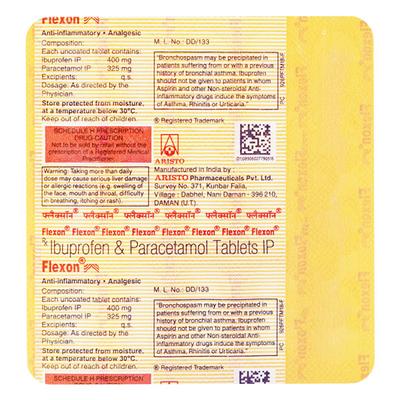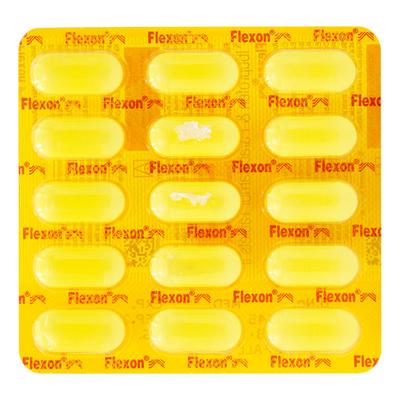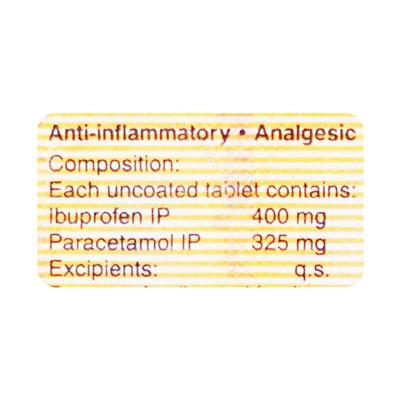

Netmeds First Membership
Quick Links
Introduction About FLEXON TABLET
FLEXON TABLET is a combination of Ibuprofen and Paracetamol, which belongs to the group of medicines called Non-steroidal anti-inflammatory drugs (NSAIDs) and Analgesics respectively. It is used to manage minor aches and pains such as headaches, toothaches, muscular aches, backaches, pain due to inflammation and for reduction of fever due to any of the above conditions in adults and children aged 12 years and above. Analgesics help to reduce fever.
Before taking this medicine, inform your doctor if you are allergic (hypersensitive) to ibuprofen, paracetamol, or any other NSAIDs such as aspirin.
Also tell the doctor if you have, liver, kidney, or heart problems. Pregnant and breastfeeding women should consult their doctors before taking the medicine.
The most common side effects are diarrhoea, nausea, vomiting, stomach pain, and dizziness. Consult your doctor for advice if any of the above side effects worsen or persist for a longer duration.
Uses Of FLEXON TABLET
- It is used to manage minor aches and pains such as headaches, toothaches, muscular aches, backaches and pain due to inflammation and for reduction of fever due to any of the above conditions
How FLEXON TABLET Works
FLEXON TABLET collectively works as non-steroidal anti-inflammatory (NSAIDs) and analgesic agent which works by inhibiting the effect of a chemical messenger called prostaglandins that are responsible for producing pain and inflammation. This blocks the Cox-enzyme (a natural substance produced in our body) thereby, restricting its action, which reduces the inflammation and pain at the site.
How to use FLEXON TABLET
Take FLEXON TABLET as advised by your physician. It can be taken with or without food.
For Tablet, Capsule: Swallow FLEXON TABLET with a glass of water. Do not crush or chew the medicine.
For Dispersible Tablet: Disperse the medicine in the specified quantity of water as mentioned in the label. Consume the medicine immediately after reconstitution.
Your doctor will decide the correct dose and duration of therapy for you depending upon your age, body weight and severity of the infection.
Side Effects Of FLEXON TABLET
Common
- dizziness
- drowsiness
- indigestion
- heartburn
- changes in kidney function
- higher levels of liver enzymes
- excessive sweating
- stomach pain
- nausea, vomiting
- diarrhoea
Uncommon
- headache
- constipation
- skin rash
- swelling of the face
- itching
- reduction in blood cells
- increase in platelets
- numbness
Rare
Stop taking this medicine and contact your doctor immediately if you experience any of the following side effects:
- signs of intestinal bleeding, symptoms include vomiting blood or looks like coffee granules, blood in the stools or black tarry stools
- signs of inflammation of the brain lining, symptoms include stiff neck, prolonged fever, feeling disoriented
- asthma, wheezing, shortness of breath
- sudden pain or tightness in the chest
- signs of a severe allergic reaction, symptoms include, swelling of the face, lips, tongue, throat, making breathing and swallowing difficult
- severe skin blistering or skin peeling, skin becomes sensitive to light
- yellowing of the skin and eyes
- swelling of other parts of the body
- signs of kidney problems, symptoms include an increase or decrease in urination, swollen legs, water retention
How To Manage Side Effects
Nausea and Vomiting:
Take this medicine with or just after a meal or a snack. Stick to simple meals. Avoid eating rich or spicy food.
Diarrhoea:
Drink lots of fluids, such as water or fruit juices to keep yourself hydrated. Avoid taking any medicine on your own for managing diarrhoea. Consult your doctor if the symptom did not improve.
Stomach pain:
Try to rest and relax. Eat and drink slowly or try to have smaller and frequent meals. Keep a heating pad on your stomach. If the symptom does not improve, contact your doctor.
Dizziness:
Try to rest and relax. Get enough sleep. Avoid driving or operating any tools or machines while you are feeling dizzy. Do not consume too much alcohol, as it can aggravate your dizziness. Consult your doctor if the symptom did not improve.
Warning & Precautions
Pregnancy
FLEXON TABLET is not recommended for use in pregnant women. Consult your doctor before taking the medicine.
Breastfeeding
FLEXON TABLET is not recommended for breastfeeding mothers. Consult your doctor before taking the medicine.
Driving and Using Machines
FLEXON TABLET should be taken with caution while driving or using machinery, as the medicine could cause dizziness, avoid driving or using heavy machinery in such conditions.
Alcohol
Consumption of alcohol should be avoided during management with FLEXON TABLET.
Kidney
FLEXON TABLET should be used with caution for patients suffering with kidney problems. Consult your doctor before taking this medicine.
Liver
FLEXON TABLET is not recommended in patients having liver damage. Consult your doctor before taking the medicine.
Allergy
Do not take FLEXON TABLET, if you are allergic (hypersensitive) to Ibuprofen or Paracetamol or any other ingredients of this medicine.
Lungs
FLEXON TABLET is not recommended in patients with a history of bronchial asthma. Consult your doctor before taking the medicine.
Heart Disease
FLEXON TABLET is not recommended in patients with a history of heart attack, bypass surgery, block in arteries, or ischemia arteries. Consult your doctor before taking the medicine.
Others
Before taking FLEXON TABLET tell your doctor if you:
- have systemic lupus erythematosus (SLE) (condition of the immune system affecting connective tissue resulting in joint pain, skin changes and disorder of other organs)
- have a blood clotting disorder
- have a gastrointestinal disorder, ulceration, bleeding in the stomach or duodenum
Use in pediatrics:
FLEXON TABLET is not recommended for children and adolescents under 12 years of age. Consult your doctor before taking the medicine.
Use in geriatrics:
FLEXON TABLET should be used with caution in elderly patients. Consult your doctor before taking the medicine.
Interactions
A. Drug-Drug interactions:
Before taking FLEXON TABLET, inform your doctor if you are taking any of the following medicine:
- other NSAIDs (Ex. naproxen, diclofenac)
- anti-hypertensives to reduce hypertension (Ex. atenolol, propranolol)
- diuretics promotes diuresis (Ex. hydrochlorothiazide, furosemide)
- cardiac glycosides to manage heart failure (Ex. digoxin, digitoxin)
- lithium to manage depression or anxiety
- methotrexate to manage cancer
- ciclosporin to manage rheumatoid arthritis
- mifepristone is used for abortion
- corticosteroids manage inflammation and allergy (Ex. prednisone, dexamethasone)
- anti-coagulants manage blood clots (Ex. warfarin)
- quinolone antibiotics are used to manage bacterial infections (Ex. ciprofloxacin, levofloxacin)
- anti-platelet agents and selective serotonin reuptake inhibitors to manage depression (Ex. citalopram, fluoxetine)
- immunosuppressant (Ex. tacrolimus)
- zidovudine to manage human immunodeficiency (HIV infection)
- cholestyramine to manage high cholesterol levels
- metoclopramide and domperidone to manage nausea and vomiting
- chloramphenicol to manage serious bacterial infections
- promethazine used to manage stomach ulcers
Overdosage:
If you or anyone else accidentally took too much of FLEXON TABLET, consult your doctor immediately. Symptoms includes nausea, upset stomach, vomiting and gastric irritation, feel light-headed, dizzy, or drowsy, excitability, convulsions, blood in urine.
Synopsis
| Drug | : | Ibuprofen and Paracetamol |
| Pharmacological Category | : | Anti-inflammatory and Analgesics |
| Therapeutic Indication | : | Manages pain and Fever |
| Dosage Forms | : | Tablet, Syrup |
More Information
- Keep out of reach of children
- Store at room temperature
FAQs About FLEXON TABLET
Q: Does FLEXON TABLET cause nausea?
A: Yes, FLEXON TABLET may cause nausea or vomiting in some people. In order to avoid the same, you can take FLEXON TABLET immediately after food or with food. If you are still experiencing excessive nausea while consuming FLEXON TABLET, speak with your doctor right away.
Q: What is FLEXON TABLET used for?
A: FLEXON TABLET is used to manage minor aches and pains such as headaches, toothaches, muscular aches, backaches, pain due to inflammation, and for the reduction of fever.
Q: What is the composition of FLEXON TABLET?
A: FLEXON TABLET is a combination of Ibuprofen and Paracetamol, which belong to the group of medicines called Non-steroidal anti-inflammatory drugs (NSAIDs) and Analgesics respectively.
Q: Does FLEXON TABLET manage rheumatoid arthritis?
A: No, FLEXON TABLET does not manage rheumatoid arthritis, but instead, it helps in reducing the pain and inflammation caused by the condition.
Q: Is FLEXON TABLET safe for pregnant women?
A: FLEXON TABLET is not recommended for pregnant women as the study shows effects of the medicine on newborns. Consult your doctor for advice.
Q: Can I take FLEXON TABLET with antibiotics?
A: FLEXON TABLET may interact with antibiotics and can produce an altered response. Consult your doctor before taking any medicine.
Q: What are the side effects of taking FLEXON TABLET?
A: The most common side effects are dizziness, drowsiness, indigestion, heartburn, changes in kidney function, higher levels of liver enzymes, excessive sweating, nervousness, headache, ringing in the ears, itching of the skin and rashes, loss of appetite, stomach pain, nausea, vomiting, and diarrhea. Consult your doctor for advice if any of the above side effects worsen or persist for a longer duration.
Q: What should I avoid while taking FLEXON TABLET?
A: Avoid consuming alcohol while taking FLEXON TABLET, as it may lead to unwanted effects.
Q: Who should not take FLEXON TABLET?
A: Do not take FLEXON TABLET if you are allergic (hypersensitive) to Ibuprofen or Paracetamol or have liver disease, bronchial asthma, history of heart attack, bypass surgery, block in arteries, or ischemia arteries. Consult your doctor before taking it.
Q: What precautions must be taken while using FLEXON TABLET?
A: Before taking FLEXON TABLET, tell your doctor if you have kidney disease, systemic lupus erythematosus (SLE) (a condition of the immune system affecting connective tissue resulting in joint pain, skin changes, and disorders of other organs), a blood clotting disorder, a gastrointestinal disorder, ulceration, or bleeding in the stomach or duodenum.
Q: Can FLEXON TABLET be taken with other medications?
A: Before taking FLEXON TABLET, inform your healthcare provider about all the medications you are currently taking, including prescription, over-the-counter, and herbal supplements, to avoid potential interactions.
Q: How long does it take for FLEXON TABLET to work?
A: FLEXON TABLET typically starts to work within 30 minutes to an hour after administration. However, the onset of action may vary depending on factors such as the individual response, the severity of pain or fever, and whether the medication is taken with food.
Q: Can FLEXON TABLET cause drowsiness?
A: Yes, drowsiness is a common side effect of FLEXON TABLET. Therefore, it's advisable to avoid activities requiring mental alertness, such as driving or operating heavy machinery, while taking this medication. If drowsiness persists or becomes severe, consult your doctor.
Q: Is FLEXON TABLET addictive?
A: FLEXON TABLET is not considered addictive when used as prescribed. However, it should only be taken according to the dosage and duration recommended by your healthcare provider.
Q: Can FLEXON TABLET be used to manage cold symptoms?
A: No, FLEXON TABLET is not used to manage cold symptoms. It is primarily used to manage minor aches and pains and to reduce fever.
Q: Can FLEXON TABLET be taken with food or on an empty stomach?
A: FLEXON TABLET can be taken with or without food. However, taking it with food may help reduce the risk of stomach upset.
References
1. Joseph. T. Dipiro. Pharmacotherapy. A Pathophysiologic Approach. Eighth edition. Page No: 1067-1068.
2. Derry, Christopher J et al. Single dose oral ibuprofen plus paracetamol (acetaminophen) for acute postoperative pain. Jun. 2013. [Accessed on 19th April 2022] https://www.ncbi.nlm.nih.gov/pmc/articles/PMC6485825/
3. Reckitt Benckiser Healthcare. Electronic Medicines Compendium (EMC). [Revised in July 2021] [Accessed on 19th April 2022] https://www.medicines.org.uk/emc/files/pil.4967.pdf
4. Alpha pharm Ptd. Limited. [Accessed on 19th April 2022] https://www.news-medical.net/drugs/Ibupane.aspx
5. European Medicines Agency. [Revised in August 2017] [Accessed on 19th April 2022] https://www.ema.europa.eu/en/documents/referral/paracetamol/ibuprofen-500mg/150mg-article-294-referral-questions-answers-paracetamol/ibuprofen-500mg/150mg-film-coated-tablets-associated-names-tablets-containing-500-mg-paracetamol-150-mg-ibuprofen_en.pdf
6. Motrin. U.S. Food and Drug Administration. [Revised in January 2007] [Accessed on 19th April 2022] https://www.accessdata.fda.gov/drugsatfda_docs/label/2007/017463s105lbl.pdf
Useful Diagnostic Tests
- Renal function test
- Liver function test
- Blood count









